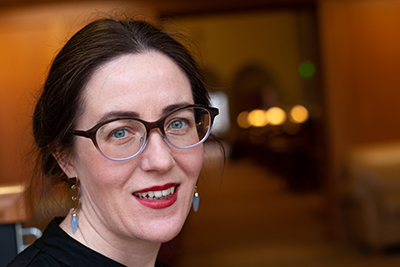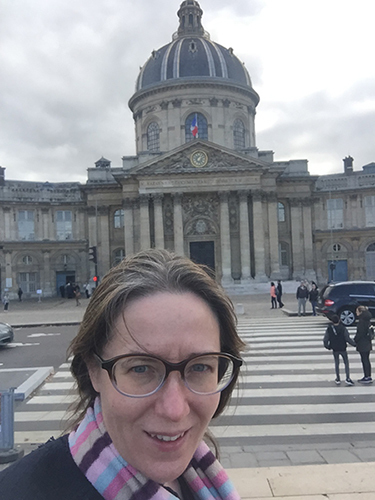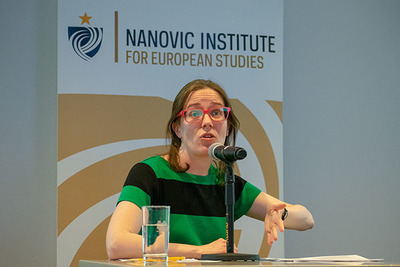
Clare O'Hare, a Nanovic Institute graduate fellow and doctoral candidate at Notre Dame Law School, received an Academic Year Travel & Research Grant to research the growth of specialized commercial courts in the context of cross-border commercial litigation.
This article is the third in a series of blog posts published by the Nanovic Institute for European Studies. The Nanovic Navigator is home to stories told by our students about their unique experiences in Europe through our student grant programs. If you have questions about a story, a student, or the Nanovic Institute, please contact Anna Dolezal, student programs assistant manager (adolezal@nd.edu).
In early 2019, two new European courts issued their first decisions—unnoticed at first, these courts are now garnering much more attention, especially as the UK prepared to leave the European Union. On January 15, 2019, the International Chamber of the Court of Appeal of Paris delivered its first judgment. On March 8, 2019, the Netherlands Commercial Court gave its first judgment. The former court issued a French judgment, accompanied by an official English translation, and the latter an English language judgment, accompanied by a summary in Dutch. These new style courts, with their English language leanings, are becoming increasingly prevalent in non-English speaking countries and are challenging for a share of the international commercial dispute resolution market.

My dissertation research seeks to both explain the rise of these new foreign “English” courts and to address what this means for the future of civil law, civil lawyers, and civil law judiciaries. Will these developments result in an even bigger role of English common law in Europe commercial transactions right as Britain departs the European Union? My dissertation will also address a crucial question on transparency and accountability: do these courts risk creating a two-tier justice system?
As a very recent phenomenon, there is only a limited (albeit growing) body of literature on the topic. The majority of the academic work to date focuses on Middle Eastern and Asian cases. Emerging literature recognizes that there are, at this stage, “more questions than answers” and that the limits of the field have yet to be determined. The stark gap in the work to date is from the lack of engagement with government publications that discuss the supposed legal, political, and economic benefits of setting up these courts. There has also been little discussion of the legacy of the legal origins theory and of how its outdated views on the common/civil law divide continue to influence actors’ preferences and drive their responses in the manners predicted by the market for law theory. This may explain a renewed convergence of international dispute resolution with English law and practice.
With funding from a Nanovic Institute Academic Year Travel & Research Grant, I traveled to Paris and London to interview practicing lawyers and members of the judiciary to discuss these new courts. During my time in Paris, I met with several lawyers and judges and visited a number of court buildings. Similarly, during my time in London, I met with a number of lawyers and foreign policy experts, along with visiting court buildings. These meetings were very instructive and opened up new avenues of research, and invitations and introductions to meet other members of the legal and policy worlds involved in these courts. They also provided me with information on the manner in which courts are funded in various jurisdictions, and I intend to do further research on this aspect of the courts during my fieldwork.
The preliminary research that I was able to conduct as a result of my Nanovic grant has provided me with grounding research from which I can continue to build the theoretical and methodological framework for my dissertation. Without the support of the Nanovic Institute for European Studies, I would have been unable to carry out these personal interviews which are enriching my work at Notre Dame. Now the basis of my dissertation, this research spans law, history, political science, and economics—and the Nanovic Institute afforded me the opportunity to interact with leading scholars across these fields in ways that just aren’t possible within individual departments.

"Brexit: What Now?" event in spring 2019.
The support I find at Nanovic goes far beyond financial. As a graduate fellow, I now have an incredible community, who are now friends as well as colleagues. While we come from a variety of departments on campus, three different continents, and five countries, we share a deep interest in all things European and are all committed to high-quality research and teaching. Our biweekly meetings are warm affairs, and we use the time to share our research and to develop a new undergraduate interdisciplinary seminar called “Contesting Europe.” For many of us, it was our first time co-teaching, and for some, it was the first time developing a new syllabus. For all of us, it was a chance to develop new teaching, leadership, and mentorship skills when we launched the course in January 2020. Having this group to lean on has been even more important as we moved the course online in the wake of the COVID-19 pandemic. We are sharing resources on how to deliver online teaching successfully and, in place of our usual coffee and treats in the Institute, we are sharing our favorite recipes now that our meetings have also gone virtual!
The Nanovic Institute provides the graduate fellows with the opportunity to engage with a broader audience. We all hope that our scholarship can contribute positively to the world. During these strange times, the Institute encouraged the graduate fellows to contribute short pieces that connect with the COVID-19 pandemic from a European perspective. COVID-19 is undoubtedly the biggest threat to integral human development that I have seen in my lifetime and I am grateful that the Institute is confident that we, the graduate fellows, can contribute to the emerging conversation.
I would like to thank the wonderful team at the Institute and my dissertation advisor, Nanovic Fellow Roger Alford, for their support this year. The Nanovic Institute provides Notre Dame students with a European home away from home and affords us so many opportunities to reach our academic and personal potential.